
This will be ugly and sad. Racism has cost this country $16 trillion over the last twenty years according to a recent Citigroup report. Much of this loss ($13 trillion) was attributed to discriminatory lending practices and the 6.1 million fewer jobs created as a result, while disparity in wages ($2.7 trillion) and discrimination in housing policies and lost income due to restricted access to higher education accounted for the balance. The report estimates that if these gaps were to be closed, an incremental $5 trillion can be added to U.S. GDP over the next five years alone. Obviously, this does not even begin to account for the extraordinary pain and suffering racism inflicts on our country, much less the dramatic implications to the health and wellbeing for those impacted by racism.
The dramatic increase in unemployment since the onset of COVID-19 has garnered significant attention. While the overall unemployment rate of 7.9% in September is down from the pandemic-high of 14.7% in April, this improvement masks the dramatic discrepancies in rates for minorities; according to the U.S. Bureau of Labor Statistics, white Americans are 7.0% unemployed while the Black unemployment rate is 12.1%. Somewhat jarring, last week Columbia University published an analysis showing that eight million more people are now living in poverty just since the expiration of the Cares Act three months ago, disproportionally hitting minorities.
The story is even more dire when looking at the “True Rate of Unemployment” as defined by the Ludwig Institute for Shared Economic Prosperity which presumes that one needs to earn a minimum living wage of $20,000 to be deemed employed. Under such a definition, Black unemployment is 30.4%, although an improvement from what was seen for the ten years after the Great Recession of 2008.
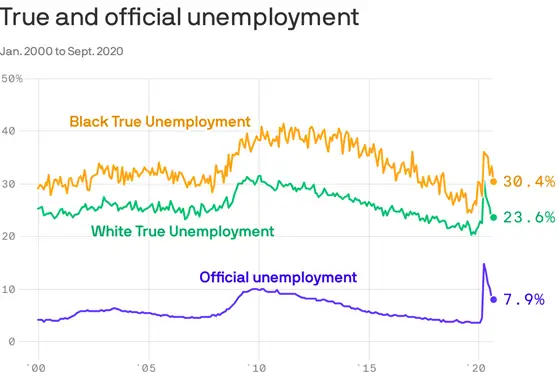
It is estimated that 100.6 million Americans are out of the labor force now, many of whom are from disadvantaged segments of the population. In fact, for those earning more than $60,000 annually, the unemployment rate is a mere 1.0% below where it stood at the onset of the pandemic. For those who make less than $20 per hour (equivalent to a salary of approximately $27,000), the unemployment rate is 17.5% below where it was in February 2020 according to Opportunity Insights. Shockingly, America’s billionaires net worth has increased more than $850 billion since April.
The difference in life expectancy between white and Black Americans is criminally high – nearly five years, even when adjusted for gender, according to the Centers for Disease Control and Prevention (CDC) data. While the underlying causes are complex and fraught with political overtones, this issue is now front and center as the country struggles with the pandemic.
Sutter Health recently published COVID-19 data that attributed the 2.7x increase in hospitalization rates in their hospitals for Black patients versus white patients to, in part, more advanced illness at the time of admission, arguably reflecting a cultural aversion to the healthcare system or challenges around adequate access. CDC data are even worse, tabulating a 5.0x higher rate of hospitalization, 2.3x greater mortality rate, and 3.0x greater infection rate for Black versus white Americans, respectively. This is particularly troublesome now with case counts spiking 17% just this past week and as winter sets in.
Life Expectancy
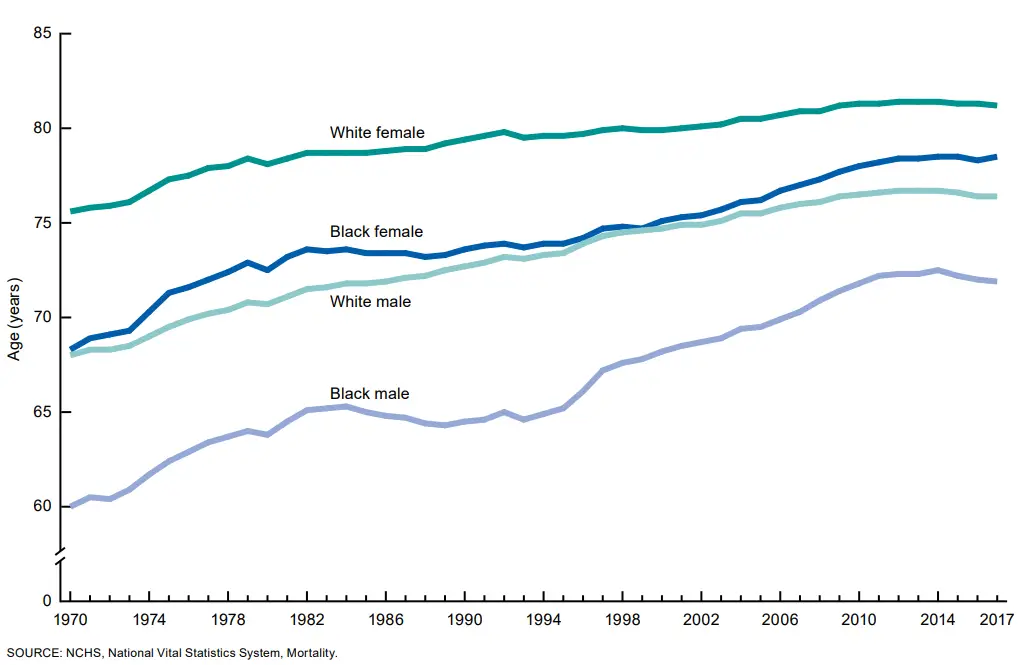
The Kaiser Family Foundation (KFF) forecasts that Medicaid roles will increase by 8.4% in 2021; in June there were 67.9 million Medicaid beneficiaries. It is quite clear that the pandemic is hitting minority and less educated segments of the population harder, often because they tend to be front-line essential workers and/or struggle with greater levels of unemployment. McKinsey recently estimated that as many as 10 million Americans will lose employer-sponsored health insurance due to COVID-19 by the end of 2021.
KFF also highlights the discrepancies in private health insurance rates by race: in 2018, white, Black, and Hispanic uninsured rates were 7.5%, 11.5% and 19.0%, respectively, which further exacerbates difficulties for minorities to access effective healthcare. The Affordable Care Act had a dramatic impact over the past decade as uninsured rates in 2010 were 13.1%, 19. 9% and 32.6%, respectively. This year the average family health insurance premium rose by 4% to more than $21,000.
While there is a heightened level of concern about the pace of coronavirus vaccine development, and whether there will be inappropriate political pressures applied to compromise long-cherished safety protocols, the Black community is expressing a particularly high level of skepticism. According to another KFF study, just under 50% of Black respondents would not take a free and safe vaccine, while only 17% would “definitely” do so. While further underscoring long-held distrust of the healthcare system, this phenomenon risks perpetuating the relatively poor health conditions experienced in many of those communities.
Recognizing this and the other numerous challenges introduced by the pandemic, the Healthcare Anchor Network (HAN) of 39 provider systems (many of whom are Flare Capital LPs) reiterated in September that racism is a public health crisis, putting forth a number of steps to chip away at these issues. First and foremost was a commitment to dramatically improve access to testing in underserved communities, as well as more robust inclusive hiring practices and greater spending with diverse suppliers and vendors.
Importantly, the HAN spotlighted that systemic racism uncouples the public health infrastructure from the private healthcare system, often leading to “generational trauma and poverty.” A profound characterization. A recent Wall Street Journal analysis of CDC data showed a strong link between racism and mental health: in the week following the murder of George Floyd in May, 40.5% of Black adults exhibited symptoms of anxiety and depression (a five-point increase from the week just prior). While somewhat similar to post-traumatic stress disorders, racism is chronic and on-going much like an injury, and should not be considered a disorder. Clinicians have now developed a “Race-Based Traumatic Stress Symptom” scale when evaluating minority patients.
Advances in healthcare technology hold profound promise to improve the health and wellbeing of those most afflicted by racism, particularly during such difficult economic times. According to a provocative analysis by McKinsey (below), many of the most seminal transformative reforms in healthcare have come on the heels of major recessions. Arguably, what has been unleashed on the U.S. economy by COVID-19 may lead to a dramatic restructuring of the healthcare industry, which could usher in a wave of significant innovation to improve conditions for those most disadvantaged.
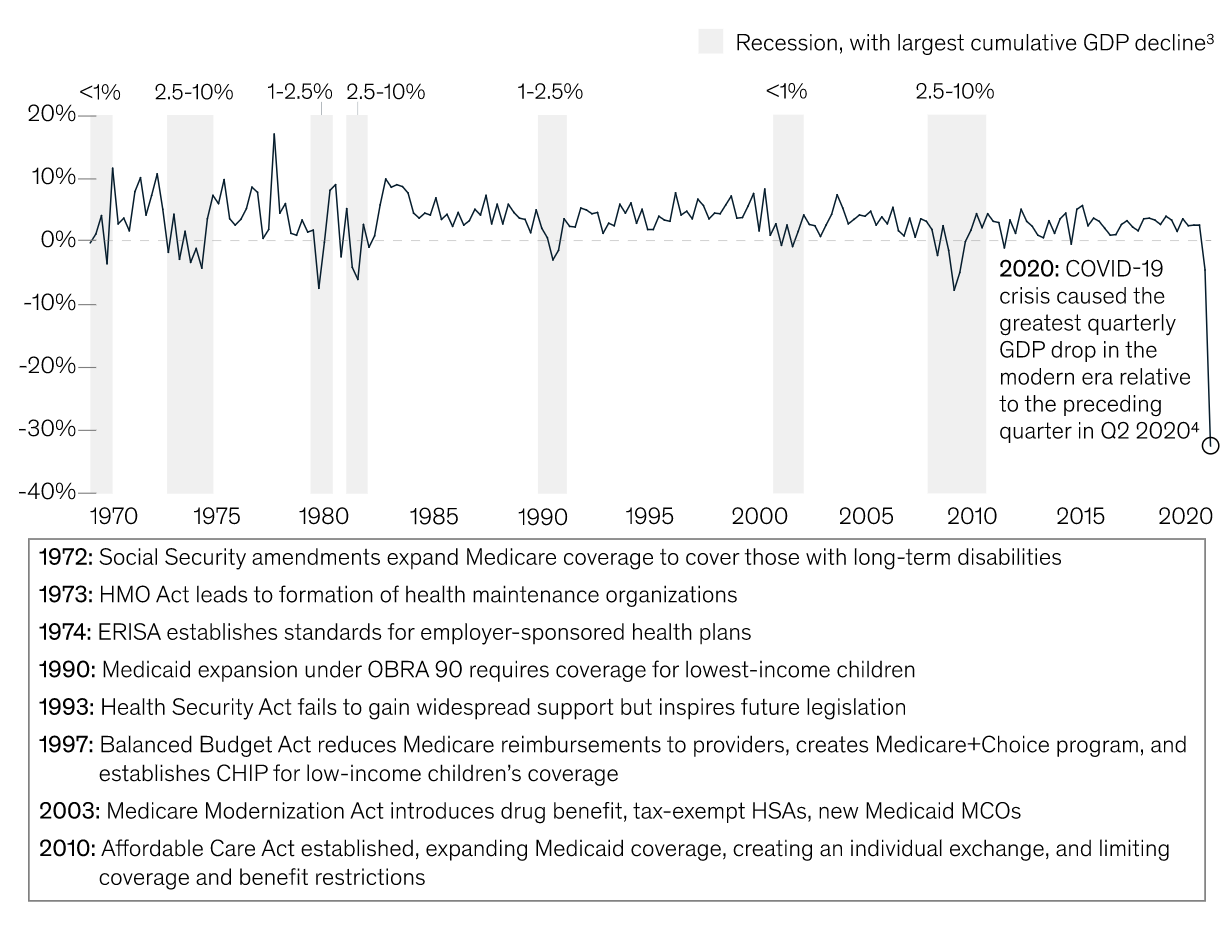
Entrepreneurship has been one of the great elixirs in the face of such devastating economic conditions and is often looked upon as one approach to reduce economic disparities due to racism. Here, unfortunately, the record is mixed. Given how critical access to capital is, the evidence that racial discrimination compromised many minority groups from accessing emergency funding programs like the Payroll Protection Program (PPP) this past spring is particularly painful. According to the Center for Responsible Lending, 46% of white-owned businesses had accessed bank credit over the past five years (compared to less than 25% for Black-owned businesses) which meaningfully facilitated their ability to secure PPP loans from those same institutions.
Furthermore, a 2016 Federal Reserve Bank study found that only 40% of minority credit applicants secure the full requested amounts of credit when applying as compared to 68% for white-owned applicants. Consistently minority-owned companies pay higher interest rates and have more onerous borrowing terms according to the Department of Commerce’s Minority Business Development Agency. The financial landscape confronting Black-owned businesses is materially more hostile than what white-owned businesses face. Full stop.
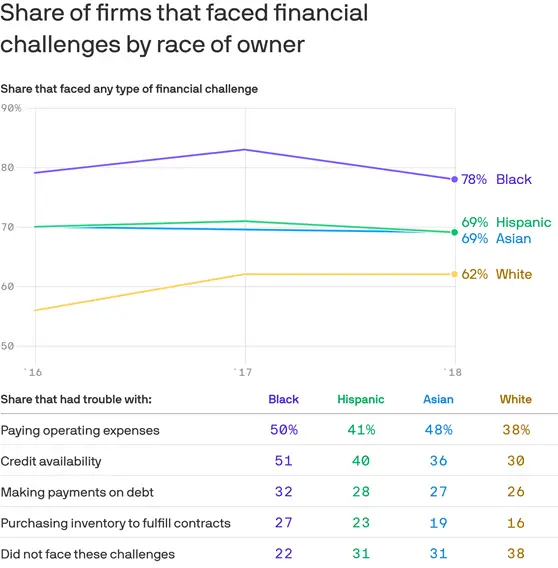
Rock Health, a leading seed-stage healthcare technology investor (and partner of Flare Capital), recently conducted an extensive diversity survey. These sober findings further highlight the issues around access to capital for minority entrepreneurs. White and Asian founders were nearly twice as likely to backed by venture capitalists; 48% of Black founders bootstrapped their companies versus 25% of white founders. Of the nearly 250 founder respondents in the survey, 12% identified as Black but only a disappointing 5% of the 425 senior executives in those companies were Black. Just over 80% of Black respondents felt that the digital health sector was either the same or less inclusive from when they initially joined the industry. Obviously, much work is still to be done.

These issues are not at all lost on my partners and our firm. Since we started Flare Capital over six years ago, we have been committed to diversity and inclusion. In addition to simply being the right thing to do, it is the best thing for our business. We will make better investment decisions with a broadly diverse set of perspectives and experiences.
But as inclusive as we felt we were, it is time to do even better. There are systemic causes to these inequities in our industry that we can help address. Over the last four months, we developed a set of new initiatives (summarized below) that we implemented earlier this summer. In summary, we identified two broad dimensions that we are committed to improving upon more equitable access and accelerated career development. Structural challenges exist for many underrepresented entrepreneurs to meet with venture capital firms, much less successfully raise capital. These are fundamental problems that require deliberate, measurable steps from engaging with more diverse founding teams, recruiting more diverse management teams, and partnering with venture firms equally committed to diversity.
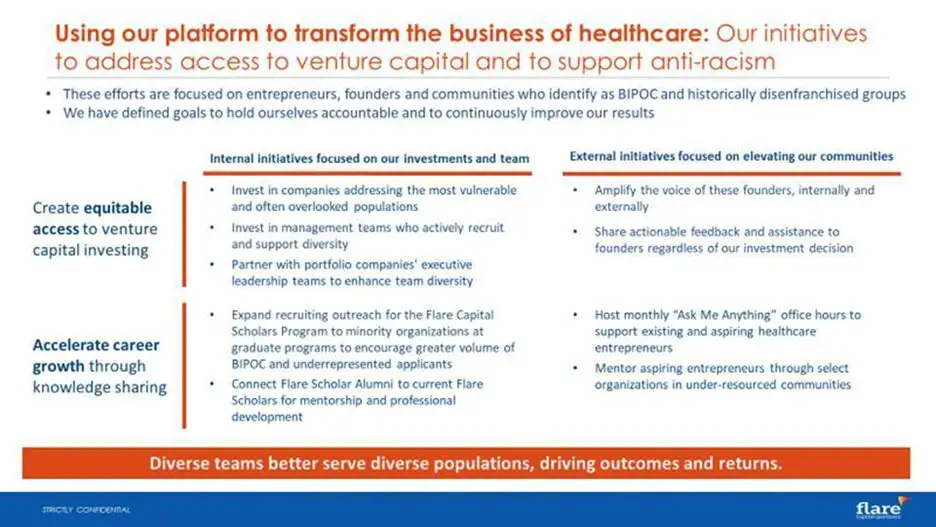
BIPOC = Black, Indigenous, People of Color
We recognize that it will take time and significant effort to address these inequities, and that success will be built, in part, upon many small victories. Arguably, Black Lives Matter is the largest movement in our country’s history. The New York Times recently estimated that between 15 to 26 million Americans likely participated in demonstrations since the death of George Floyd in late May. We are proud to be a part of that movement.
About Michael A. Greely
Michael A. Greely is the CoFounder and General Partner at Flare Capital Partners, a venture capital firm focused on investing in early-stage and emerging healthcare technology companies. Previously, Michael was the founding General Partner of Flybridge Capital Partners where he led the firm’s healthcare investments. Current and prior board seats include Aspen Health, BlueTarp Financial, Circulation, Explorys, Functional Neuromodulation, HealthVerity, higi, Iora Health, MicroCHIPS, Nuvesse, PolyRemedy, Predictive Biosciences, Predilytics, T2 Biosystems, TARIS Biomedical, VidSys and Welltok (observer).